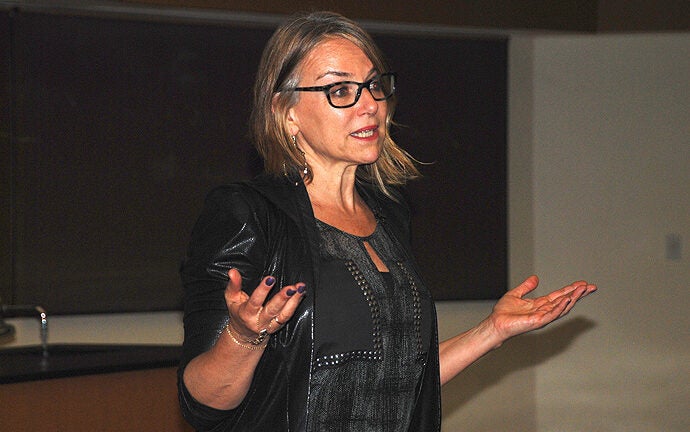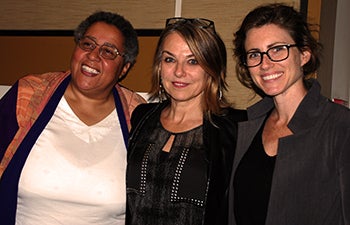
Unlocking Erotic Intelligence
When Esther Perel arrived at USC to deliver a Barbra Streisand Professor Lecture on April 27, she began by talking about her recent TED Talk on infidelity.
“Monica Lewinsky started the day and I closed the day,” said Perel of the 2015 TED Talks in Vancouver, Canada. “It was very fitting.”
A celebrated New York couples therapist whose book Mating in Captivity: Unlocking Erotic Intelligence (Harper, 2006) is an international bestseller, Perel credits the 1998 political sex scandal involving Lewinsky, a former White House intern, and then United States President Bill Clinton with launching her career.
“The Lewinsky scandal was very intriguing for me, as it was for many foreigners,” Belgian-born Perel told the audience assembled in Seeley G. Mudd Hall on USC’s University Park campus. “Why was America so tolerant about multiple divorces and yet so intransigent about the slightest infidelity? The rest of the world that was more family-oriented had already opted [to do things] the other way around.”
The scandal prompted Perel to research and write an article, “In Search of Erotic Intelligence,” which became the basis for her book.
“Inviting Esther Perel to USC was a fitting way to thank Barbra Streisand for her generosity to the gender studies program,” said Sheila Briggs, associate professor of religion and gender studies, and interim director of the gender studies program. “Both women have a passionate commitment to keeping us thinking about what love and sex mean in an age of gender equality.”

From left, USC Dornsife’s Sheila Briggs, associate professor of religion and gender studies, and interim director of the gender studies program, keynote speaker Esther Perel and Jesse Brown of the Barbara Streisand Foundation.
Perel said she wrote the book because she was curious about the phenomenon she often encountered in her practice of couples who still loved one another, but no longer had sex.
“To write a book about people who can’t stand each other and don’t want to touch each other, what’s new?” Perel said, “But to write about people who stay deeply engaged and connected to each other but face erotic deadness, now that becomes interesting.
“For most couples, the concept of a passionate marriage is an absolute contradiction in terms.”
To find out why this was the case, Perel began asking fundamental questions about love, desire and eroticism, namely: “Why does good sex so often fade, even for people who continue to love each other? Why does good intimacy not guarantee good sex, despite what we keep being told in monthly magazines? Why does sex make babies and yet babies spell erotic disaster in couples? Why is the forbidden so erotic? Can we want what we already have?”
In writing her book, Perel said she began to ponder these questions and to explore the tensions that arise when our need for security and stability clashes with our need for adventure and passion.
The problem, according to Perel, is that our modern idea of love incorporates seemingly contradictory ideals. On one hand we crave the traditional benefits of marriage including security, stability, predictability, reliability and dependability — all the things that anchor us and give us a sense of home. But now we also want to experience mystery, novelty, excitement, change, risk — even danger.
“I want being with the same person to have comfort and to have edge; I want you to be familiar and I want you to be surprising; I want you to give me stability and I want you to be unpredictable,” Perel said. Today, couples want their partners to provide everything we always wanted from traditional marriage … But now I also want you to be my best friend and trusted confidante and my passionate lover for about six or seven decades.”
Perel said that today’s relationships are crumbling under the weight of these unrealistic expectations. “I have gone to many weddings and what people are putting in their vows today is a recipe for disaster,” she said. “We are asking one person to give us what once a whole community used to provide.”
Drawing an analogy between sex and desire and her personal experience of her own community of 15,000 Jewish Holocaust survivors in Antwerp, Belgium, Perel came to important conclusions about how eroticism requires imagination, playfulness and trust in order to function.
“I noticed there were two groups of people: those who did not die and those who came back to life,” she said. “Those people who did not die are often people who lived tethered to the ground. They were worried, there was danger and risk and they couldn’t trust. If you can’t trust, you can’t play, and if you can’t play, you can’t have good sex.
The people who had come back to life were people who understood the erotic as an antidote to death. They knew how to engage their imaginations when they were in dire circumstances in order to continue to have hope, pleasure, to feel good, to soothe themselves. From this I drew the conclusion that sex isn’t just something we do, sex is a place we go.”
The paradox of long-term relationships, Perel said, is that when we love someone, we desire more intimacy, yet the more intimate we become, the less desire flourishes.
The answer, Perel said, is that while love seeks closeness and intimacy, desire requires mystery, spontaneity and space to thrive.
“When you look at your partner from a comfortable distance so you have just enough familiarity not to be anxious, and just enough distance so that you can see stuff that you don’t normally see, then in this space between me and the other lies the erotic,” Perel said. “It is this space that reminds me of Proust’s famous phrase: ‘The real voyage of discovery consists not in seeking new landscapes, but in having new eyes.’ And that mystery is sometimes nothing more than a shift in perception.
“The unknown is right next to you, if you are willing to engage with it.”